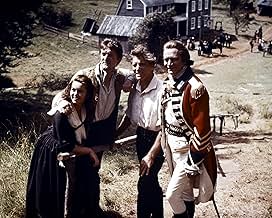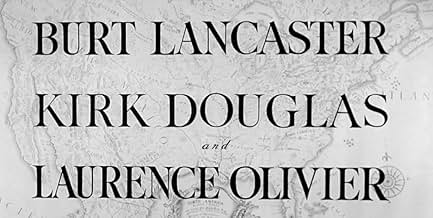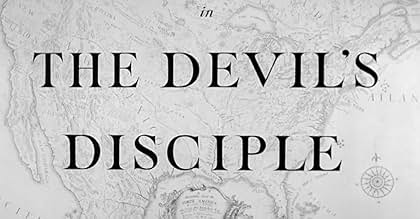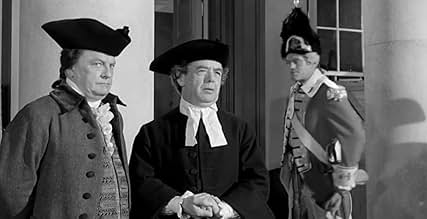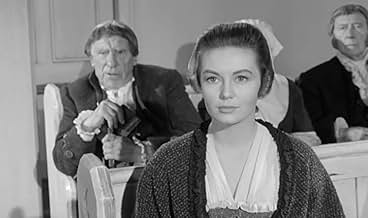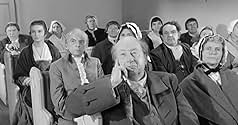IMDb RATING
6.9/10
3.2K
YOUR RATING
The black sheep of a family and the local minister discover their true vocations during the Revolutionary War.The black sheep of a family and the local minister discover their true vocations during the Revolutionary War.The black sheep of a family and the local minister discover their true vocations during the Revolutionary War.
- Directors
- Writers
- Stars
- Nominated for 1 BAFTA Award
- 1 nomination total
Neil McCallum
- Christie Dudgeon
- (as Neil Mc Callum)
Joe Beckett
- British Officer
- (uncredited)
Steven Berkoff
- British Corporal
- (uncredited)
- Directors
- Writers
- All cast & crew
- Production, box office & more at IMDbPro
6.93.2K
1
2
3
4
5
6
7
8
9
10
Featured reviews
Overlooked , underrated gem
Oddly enough, very few good films have been made about The American revolution, and this is one of them.Kirk Douglas and Burt Lancaster put in very fine performances, with Lancaster acting against type as the priggish, self-righteous minister who transforms himself into a dashing, wickedly, hero, and Kirk Douglas as the sardonic, cynical, Satanic, selfish, and utterly delightful Dick Dudgeon, who transforms himself inot an altruistic, self sacrificing hero. Laurence Oliviers performance is little too langourous and flat, until he delivers the films great punch-line, "history will lie, as usual." Of course, it may be that the films sharp-eyed, toughly ironic view of the revolution has militated against it ever gaining the popularity it deserves
Better than just good !
It has been years since I've actually seen the movie and was disappointed that it can't presently be found on DVD. Yet, while fiction, it is a tight, well acted piece of near dark comedy placed in a revolutionary war setting.
Lancaster's portrayal is akin to his as the somewhat self-righteous Wyatt Earp in O.K. Corral. Probably the wittiest scene is played between the prisoner Douglas and Sir Laurence (Gentleman Johnny Burgoyne) as a straight man with a bit of a twinkle in the eye. First with Olivier near whining to Kirk how he'd think better of him if he only knew how much he'd paid for his commission - a common practice in German George's British army.
Convicted and scheduled to hang, Douglas demands a soldier's firing squad only to talked out of it by Gen'l. Burgoyne decrying - with wry historical accuracy, the woeful state of marksmanship of the average Red Coat then serving in the Colonies. "Well then, by all means hang me !"
Delightful, well paced, funny, and even a tad dramatic with Burt, like Disney's Lambert the Bashful Lion, finally roaring to the height of minuteman steel in the final scenes.
Lancaster's portrayal is akin to his as the somewhat self-righteous Wyatt Earp in O.K. Corral. Probably the wittiest scene is played between the prisoner Douglas and Sir Laurence (Gentleman Johnny Burgoyne) as a straight man with a bit of a twinkle in the eye. First with Olivier near whining to Kirk how he'd think better of him if he only knew how much he'd paid for his commission - a common practice in German George's British army.
Convicted and scheduled to hang, Douglas demands a soldier's firing squad only to talked out of it by Gen'l. Burgoyne decrying - with wry historical accuracy, the woeful state of marksmanship of the average Red Coat then serving in the Colonies. "Well then, by all means hang me !"
Delightful, well paced, funny, and even a tad dramatic with Burt, like Disney's Lambert the Bashful Lion, finally roaring to the height of minuteman steel in the final scenes.
You Will Want to Slap Her
Having seen The Devil's Disciple on a venue that runs films which have fallen into the public domain, I wonder how anyone could have let copyright lapse on such an intriguing, yet quirky, film as this. With it's triumvirate of strong leading men, and an interesting script, this movie should be much more well known. And with it's rather oddball presentation it's surprising that it does not have cult status.
The live action segments are excellent, and there is no slack in the acting or direction. However, some poor soul made the bizarre decision to interject little Rankin-Bass type puppet animation segments at nearly random moments, thoroughly negating - each time - all the dramatic momentum that has been accumulated up to that point. The animated segments are well done, and moderately amusing in and of themselves, yet completely incongruous to the tone of the surrounding film.
These segments are, however, a minor flaw when compared with the greatest drawback of this movie. I am referring to the character of Judith Anderson, our hero's wife. She is, without a doubt, the most annoyingly fickle and foolish female character that I can recall having ever witnessed in any film; and very nearly the most hysterical as well. Not too far into the story I began to get the feeling that I would very much like to slap her. Halfway through the film I was consciously rooting for each of the male leads to take a turn slapping her. By the end of the film I was convinced that everyone in the film should have slapped her, and probably the crew as well! The only thing that made this character bearable was the calm, good-natured presence of Lancaster, Douglas, and Olivier.
Now, this is not intended to denigrate Miss Janette Scott, who portrayed Mrs. Anderson. On the contrary, she did a remarkable job of making this over-the-top hysterical woman seem real. A lesser actress might have easily come off as overly melodramatic and phony in such an extreme performance. Her skill in the performance is the reason that we want to slap her. Kudos to Janette Scott. It is my opinion that almost everyone who watches this film will, in fact, want to slap her. Be prepared.
The live action segments are excellent, and there is no slack in the acting or direction. However, some poor soul made the bizarre decision to interject little Rankin-Bass type puppet animation segments at nearly random moments, thoroughly negating - each time - all the dramatic momentum that has been accumulated up to that point. The animated segments are well done, and moderately amusing in and of themselves, yet completely incongruous to the tone of the surrounding film.
These segments are, however, a minor flaw when compared with the greatest drawback of this movie. I am referring to the character of Judith Anderson, our hero's wife. She is, without a doubt, the most annoyingly fickle and foolish female character that I can recall having ever witnessed in any film; and very nearly the most hysterical as well. Not too far into the story I began to get the feeling that I would very much like to slap her. Halfway through the film I was consciously rooting for each of the male leads to take a turn slapping her. By the end of the film I was convinced that everyone in the film should have slapped her, and probably the crew as well! The only thing that made this character bearable was the calm, good-natured presence of Lancaster, Douglas, and Olivier.
Now, this is not intended to denigrate Miss Janette Scott, who portrayed Mrs. Anderson. On the contrary, she did a remarkable job of making this over-the-top hysterical woman seem real. A lesser actress might have easily come off as overly melodramatic and phony in such an extreme performance. Her skill in the performance is the reason that we want to slap her. Kudos to Janette Scott. It is my opinion that almost everyone who watches this film will, in fact, want to slap her. Be prepared.
A wonderful film!
Kirk Douglas plays the title character with charm and panache, Lancaster delivers one of his best performances, and Olivier is an absolute delight in his smooth-as-silk portrayal of "Gentlemanly Johnny!" A pleasure to watch -- Bravo!
Olivier Flat in "Devil's Disciple"?
This is in answer to otter_c, who wrote: "The only disappointment is Laurence Olivier as General Burgoyne. Olivier castigated himself in his autobiography for botching one of Shaw's most hilarious roles, his personal griefs were overwhelming him at the time. He's nervous and unfocused, line after wonderful line falls flat. (He returned to form shortly after in "Spartacus" and "The Entertainer")"
All due respect to both you and Sir Lawrence, but I think this is an instance where his self-appraisal is a little off-target.
I've always enjoyed this performance as a very excellent portrait of a thinking man and wit under a great deal of pressure, with no idea that Olivier did not care for it -- thing is, Burgoyne IS distracted; he has more important fish to fry than this petty punitive hanging, and even before he gets the news about Howe he is deeply concerned for the continued viability of his command: He tosses off his bon mots as the after-thoughts of the kind of intellect who could actually write plays when he wasn't under siege in an unpopular war in unfriendly country.
And I find that makes them and Burgoyne funnier than, say, Ian Richardson's total self- awareness in the '87 BBC production.
Olivier liked to be In Control when he worked; and in some of the roles in which I do not much care for him I feel it makes him artificial and excessively mannered. So naturally, a performance given when he was overwhelmed with grief is gonna rankle the perfectionist in him; but since he was preoccupied with other, more important (to him) matters it put him willy-nilly square in the same frame of mind as I gauge Gentlemanly Johnny to have been in as disaster loomed, I feel it really helps make the performance live in a way the studied Olivier technique might not have come within yards of.
The two men -- the actor and the general he portrays -- are up against it, but instinct pulls each through even if more distractedly than if under less severe constraints; there is still enough of the essence of each to make a credible showing.
The artist is not always the best critic of his own work; and Olivier's General Burgoyne is excellent work whether the actor knew what he was doing or not.
All due respect to both you and Sir Lawrence, but I think this is an instance where his self-appraisal is a little off-target.
I've always enjoyed this performance as a very excellent portrait of a thinking man and wit under a great deal of pressure, with no idea that Olivier did not care for it -- thing is, Burgoyne IS distracted; he has more important fish to fry than this petty punitive hanging, and even before he gets the news about Howe he is deeply concerned for the continued viability of his command: He tosses off his bon mots as the after-thoughts of the kind of intellect who could actually write plays when he wasn't under siege in an unpopular war in unfriendly country.
And I find that makes them and Burgoyne funnier than, say, Ian Richardson's total self- awareness in the '87 BBC production.
Olivier liked to be In Control when he worked; and in some of the roles in which I do not much care for him I feel it makes him artificial and excessively mannered. So naturally, a performance given when he was overwhelmed with grief is gonna rankle the perfectionist in him; but since he was preoccupied with other, more important (to him) matters it put him willy-nilly square in the same frame of mind as I gauge Gentlemanly Johnny to have been in as disaster loomed, I feel it really helps make the performance live in a way the studied Olivier technique might not have come within yards of.
The two men -- the actor and the general he portrays -- are up against it, but instinct pulls each through even if more distractedly than if under less severe constraints; there is still enough of the essence of each to make a credible showing.
The artist is not always the best critic of his own work; and Olivier's General Burgoyne is excellent work whether the actor knew what he was doing or not.
Did you know
- TriviaThe character of The Reverend Anthony Anderson was loosely based on the historical figure of Peter Muhlenberg, known as the "Fighting Parson of the American Revolution".
- GoofsSeveral times while going through the forest, the British refer to "snipers." However, the term sniper didn't come into being until about 40 years after the American Revolutionary War. The term came into usage in 1824, while the war ended in 1783.
- Quotes
Major Swindon: What will history say, sir?
General John Burgoyne: History, sir, will tell lies, as usual!
- Crazy creditsThe opening credits appear over a map of North America during the Revolutionary War, which then zooms into an animated battle played out by paper models.
- ConnectionsReferenced in Bells Are Ringing (1960)
- SoundtracksYankee Doodle
(uncredited)
traditional 18th Century Anglo-American folk song
Heard under main title
- How long is The Devil's Disciple?Powered by Alexa
Details
- Release date
- Countries of origin
- Language
- Also known as
- El discípulo del diablo
- Filming locations
- Production companies
- See more company credits at IMDbPro
Box office
- Budget
- $1,500,000 (estimated)
- Runtime
- 1h 23m(83 min)
- Color
- Aspect ratio
- 1.85 : 1
Contribute to this page
Suggest an edit or add missing content


